Related Research Articles

Dangerous Visions is a science fiction short story anthology edited by American writer Harlan Ellison and illustrated by Leo and Diane Dillon. It was published in 1967.

Algirdas Jonas "Algis" Budrys was a Lithuanian-American science fiction author, editor, and critic. He was also known under the pen names Frank Mason, Alger Rome, John A. Sentry, William Scarff, and Paul Janvier. He is known for the influential 1960 novel Rogue Moon.
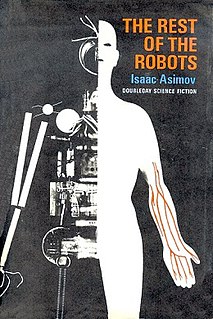
The Rest of the Robots is a collection of eight short stories and two full-length novels by American writer Isaac Asimov, published in 1964. The stories, centred on positronic robots, are all part of the Robot series, most of which take place in the Foundation universe. Another collection of short stories about robots, I, Robot, was re-published in the previous year, which is why Asimov chose to title the collection as The Rest of the Robots. None of the short stories in this collection were in I, Robot, however all of them were later included in The Complete Robot, and both novels about Elijah Baley were also published separately.

The Past Through Tomorrow is a collection of science fiction stories by American writer Robert A. Heinlein, all part of his Future History.
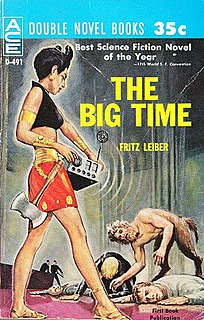
The Big Time (1958) is a short science fiction novel by American writer Fritz Leiber. Awarded the Hugo Award during 1958, The Big Time was published originally in two parts in Galaxy Magazine's March and April 1958 issues, illustrated by Virgil Finlay. It was subsequently reprinted in book form several times. The Big Time is a story involving only a few characters, but with a vast, cosmic back story.

"Marooned off Vesta" is a science fiction short story by American writer Isaac Asimov. It was the third story he wrote, and the first to be published. Written in July 1938 when Asimov was 18, it was rejected by Astounding Science Fiction in August, then accepted in October by Amazing Stories, appearing in the March 1939 issue. Asimov first included it in his 1968 story collection Asimov's Mysteries, and subsequently in the 1973 collection The Best of Isaac Asimov.
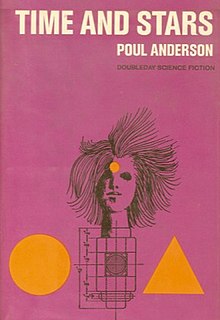
Time and Stars is a collection of science fiction short stories by American writer Poul Anderson, published in 1964.

"If There Were No Benny Cemoli" is a science fiction short story by American writer Philip K. Dick, first published in the December, 1963 issue of Galaxy magazine with illustration by Lutjens.
Thomas L. Sherred was an American science fiction writer.
"The Jigsaw Man" is a science fiction short story by American writer Larry Niven, set in the Known Space universe. The story was first published in Harlan Ellison's anthology Dangerous Visions, and is included in Niven's collections All the Myriad Ways and Tales of Known Space.

The Squares of the City is a science fiction novel by British writer John Brunner, first published in 1965 (ISBN 0-345-27739-2). It was nominated for the Hugo Award for Best Novel in 1966.
"The Doll-House" is a short story by Hugh Jones Parry, under the name "James Cross". It was first published in Harlan Ellison's 1967 science fiction anthology Dangerous Visions.
"If All Men Were Brothers, Would You Let One Marry Your Sister?" is a science fiction short story by American writer Theodore Sturgeon. It first appeared in Harlan Ellison's anthology Dangerous Visions in 1967.
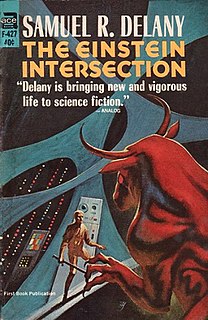
The Einstein Intersection is a 1967 science fiction novel by Samuel R. Delany. The title is a reference to Einstein's Theory of Relativity connecting to Kurt Gödel's Constructible universe, which is an analogy to science meeting philosophy. Delany's intended title for the book was A Fabulous, Formless Darkness.

Man of Earth is a science fiction novel by American writer Algis Budrys, first published in 1958 by Ballantine Books. "The Man from Earth", a "greatly different" earlier version of the story, was published in the debut issue of Satellite Science Fiction in 1956.

The Watch Below (1966) is a science fiction novel by British writer James White about a colony of humans stranded underwater in a sunken ship, who survive by air pockets, and a water-breathing alien species in search of a new home. The two generation ships encounter each other in the Earth's ocean.

"Mars Is Heaven!" is a science fiction short story by American writer Ray Bradbury, originally published in 1948 in Planet Stories. "Mars Is Heaven!" was among the stories selected in 1970 by the Science Fiction Writers of America as one of the best science fiction short stories published before the creation of the Nebula Awards. As such, it was published in The Science Fiction Hall of Fame Volume One, 1929–1964. It also appears as the sixth chapter of The Martian Chronicles, revised as "The Third Expedition."
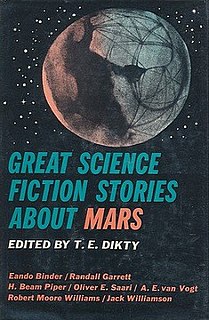
Great Science Fiction Stories About Mars is a 1966 anthology of science fiction short stories edited by T. E. Dikty and published by Fredrick Fell. Most of the stories had originally appeared in the magazines Startling Stories, Argosy, Thrilling Wonder Stories, Amazing Stories, Super Science Stories and Astounding SF.

Davy is a post-apocalyptic science fiction novel by American writer Edgar Pangborn, nominated for the 1965 Hugo Award. It is set in the Northeastern United States some centuries after an atomic war ended high-technology civilization, with some scenes on an unnamed Atlantic island.

Neutron Star is a collection of science fiction short stories by American writer Larry Niven, published in April 1968. The individual stories were published in If and Galaxy Science Fiction in 1966–1967, under Frederik Pohl as editor.
References
- ↑ Galaxy Bookshelf, by Algis Budrys, in Galaxy Science Fiction , April 1968, p 162, via archive.org
- ↑ Viziuni periculoase, edituratrei.ro